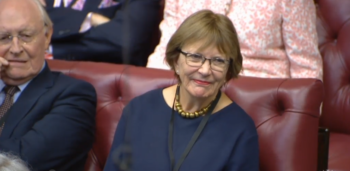
Humanists UK has been working with the Home Office this year to introduce new training for all asylum assessors on claims related to freedom of religion or belief. The new day-long training, which will be the first specific training on the matter, will be rolled out early next year.
The new training fulfils a key demand made in Humanists UK’s petition to the Home Office concerning humanists’ asylum claims in January, after Pakistani humanist Hamza bin Walayat was told he would be deported for failing to identify Plato and Aristotle as humanists (in spite of the fact that neither are). Hamza’s case received widespread media attention, and prompted 150 philosophers to sign a letter pointing that the test was both unreasonable and philosophically illiterate. Over 12,500 people signed a letter to the Home Secretary demanding better training on humanism and justice for Hamza, who as an ‘apostate’ faced death if returned to his home country.
The new Home Office training materials are being produced in coordination with Humanists UK, the All Party Parliamentary Group on International Freedom of Religion or Belief (APPG on FoRB), and the Asylum Advocacy Group. Humanists UK has been working on them since the spring. The introduction of the training was announced by Home Office minister Baroness Williams of Trafford in the House of Lords yesterday, in response to an oral question from APPG on FoRB Co-Chair Baroness Berridge.
Co-Chair of the All Party Parliamentary Group Baroness (Joan) Bakewell raised Hamza’s plight in the Lords debate, and was told that ‘The noble Baroness outlines precisely why training in religious literacy and, indeed about those who have no beliefs or are humanists, which is a belief in and of itself, is required in order to make proper decisions.’ In response to a subsequent question, she added ‘I would struggle with the questions proposed by the noble Baroness, Lady Bakewell [i.e. those that were put to Hamza about Plato and Aristotle], and might also struggle with questions on my religion.’
Humanists UK has been led to believe that the training may in fact be the most advanced in Europe, with no other country having compulsory training of this nature.
Welcoming the announcement of the upcoming training, Humanists UK Chief Executive Andrew Copson commented, ‘We are delighted to have worked with the Home Office on this new training on freedom of religion or belief for all asylum assessors and look forward to seeing it rolled out in the new year. We hope it will mean that the sort of assessments that have affected the lives of non-religious claimants so severely in the past won’t be repeated in the future.’
Hamza bin Walayat commented, ‘I’m pleased that this training is being introduced and our hard work on this is paying off. I hope what happened to me won’t happen to others in the future, and that the hard work of Humanists UK is starting to end discrimination against non-religious asylum claimants.’
Notes
For further comment or information, please contact Humanists UK Director of Public Affairs and Policy Richy Thompson on richy@humanists.uk or 020 3675 0959.
Read the transcript of yesterday’s debate: https://hansard.parliament.uk/Lords/2018-10-15/debates/2F85B17E-85B9-49C5-A2D0-CB899614796B/AsylumApplications
Baroness Bakewell asked Baroness Williams: ‘My Lords, there was considerable publicity around the case of the Pakistani humanist Hamza bin Walayat who failed his asylum application in part, it is thought, because he failed to identify Plato and Aristotle as humanists. What steps will the Home Office take to ensure that asylum assessors are better educated about the beliefs of non-religious people, including humanists?’
At Humanists UK, we advance free thinking and promote humanism to create a tolerant society where rational thinking and kindness prevail. Our work brings non-religious people together to develop their own views, helping people be happier and more fulfilled in the one life we have. Through our ceremonies, education services, and community and campaigning work, we strive to create a fair and equal society for all.
